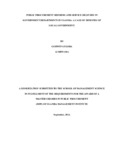Public procurement reforms and service delivery in government departments in Uganda: A case of Ministry of Local Government.
Abstract
The study established the relationship between procurement reforms and service delivery in
government departments in Uganda taking a case of the Ministry of Local government.
Specifically, the study investigated the relationship between: public procurement legal-regulatory
reforms; public procurement organization-structure reforms; professionalization of the PDU, and
service delivery in government agencies taking a case of Ministry of Local government of
Uganda. A Case study research design was used, adopting a triangulation of both qualitative and
quantitative approaches of data collection and analysis. Questionnaires and interview guides
were used to collect data from a sample size of 36 respondents. The quantitative data was
analysed using descriptive statistics and Pearson correlation techniques. The findings showed
that, procurement legal – regulatory reforms, structural – institutional reforms and
professionalisation of PDU all positively and significantly contributed to service delivery, with
structural – institutional reforms registering the highest correlation. On the basis of the findings,
the researcher concluded that: Realization of effective service delivery is hinged on strong and
consistent legislation focusing on internal weaknesses related to violation of the existing controls
which can affect service delivery. The study recommended that; there is need to have a strong
and consistent legislation in place. In addition, MoLG should consider adopting new approaches
to procurement management, so as to strengthen the structural – institutional aspect, and finally,
there is need to set clear parameters for the procurement practice and have it recognised as other
traditional professions.

